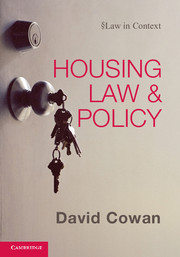1 - Locating housing law and policy
Published online by Cambridge University Press: 05 June 2012
Summary
It probably seems strange to begin a book about housing law and policy with a chapter which seeks to ‘locate’ the subject. In one sense, the location of the book is determined by its subject-matter – housing – and its descriptors – law and policy. However, the purpose of this chapter is somewhat deeper than that narrow sense. The purpose of this chapter is to locate the ways in which we think about housing law and policy by uncovering the assumptions and (to a certain extent, hidden) truths of the dual disciplines of law and policy in relation to housing. This is an ambitious way to start a text, but it is important in appreciating both the limits of thought about housing law and policy as well as their current constitution. If you like, the attempt here is to provide a partial genealogy of the subject because the subject was not preordained and, indeed, remains an ongoing project. It is an ongoing project for at least three reasons – first, the history of housing law and policy is a history to a large extent of cycles of failure and re-invention; second, it is a history in which state sovereignty and individual responsibility have vied for primacy; and, third, housing’s uncertain relationship with the welfare state is reflected in the identity of the subject to the extent that we might ask, ‘what is social about social housing?’ (discussed in Cowan and McDermont 2006). In large part, it is these three ideas that are the underlying themes of this book.
Thus, this chapter concerns what is meant by the study of housing law and policy, locating the law–policy interaction, and how this identity of the subject-matter maps on to the structure adopted in this book. The opening sections identify the disciplines of housing law and policy separately through certain analytical themes which are brought together in these subjects. What this discussion is designed to demonstrate is that both housing law and housing policy are ‘destination subjects’. They bring together within their rubric a variety of ideas, theories and perspectives drawn from other sources. To put it another way, they are parasitic on those other sources. In demonstrating this, the task of explaining the evolution of today’s housing relations is also begun.
- Type
- Chapter
- Information
- Housing Law and Policy , pp. 1 - 26Publisher: Cambridge University PressPrint publication year: 2011



